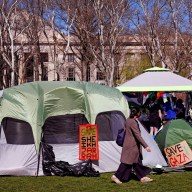VANCOUVER, B.C. – The community of Barriere, B.C., has finally found a way to give back for the help it received in 2003 as a fast moving forest fire ravaged the town.
The district is sending half of its firefighting equipment and six of its volunteer firefighters to stand between a forest fire and the community of Lillooet.
Barriere lost more than 70 homes and half a dozen businesses, including the Tolko mill and its 120 jobs, when the fire roared through the community six years ago.
Barriere Mayor Mike Fennell said it could have been worse.
“We had so many fire departments when we had our major fires in 2003 that sent their equipment and personnel to help us out and that’s actually what saved the town of Barrier, and so we were requested and we felt obligated to do whatever we could do to help Lillooet out.”
The district only has two pumper trucks, a tanker and a bush truck. It will send one pumper and the bush truck.
Fennell said the community has also been reassured by other nearby fire departments that the town will have help in the event of any local emergency.
Barriere is one of 18 municipal fire departments loaning staff, pumper trucks and other equipment to protect homes and buildings threatened by the many out-of-control fires burning in B.C., the province’s Public Safety Ministry said Tuesday.
The urban equipment and manpower will be used to form a last stand between raging forest fires and threatened communities.
Exhausted fire crews in the province will also be getting some international help from 30 fire specialists from Australia and New Zealand
“The large number of fires is stretching our resources,” Forests Minister Pat Bell said in a news release Tuesday.
The fires are also pushing the provincial firefighting budget to the breaking point.
The budget this year was $61 million, but the bill has reached about $110 million and goes up by $3 million every day.
Prime Minister Stephen Harper, who spent Tuesday in the Vancouver area, called the fires a very worrisome situation.
He told reporters the federal government has a Disaster Relief Act in place to help in situations such as these.
“Do we expect it to be triggered in this case. I would think so.”
Harper said the concern right now is less about cost and more about tackling the problem effectively.
The call for help from urban departments indicates fire officials believe buildings and homes are at a greater risk.
Jeff Ullyot, assistant fire chief in Chilliwack, said the crew of seven that he’s sending will be called out only to protect property.
“I think the province is being proactive in deploying resources early,” he said.
“Certainly the fires in Lillooet are only a kilometre from structures, and that doesn’t take a long time to travel when it comes to winds.”
There are already 850 personnel from across the country in B.C., along with the province’s firefighting team of almost 3,000.
Of 11 interface fires in the province, 10 of them have triggered evacuations.
In some communities, just a handful of residents have been ordered out as fires encroach on their homes. In others, the evacuees total several thousand.
Near Lillooet, the next two or three days will be critical as crews try to get the upper hand on a wildfire that now covers 33 square kilometres and threatens to engulf the town.
Roughly 2,300 people were forced from their homes on Sunday as strong winds pushed flames within sight of the town, located on the edge of the Fraser River about 250 kilometres northeast of Vancouver.
Residents have been told it will be the end of the week at the earliest before there’s a break in the hot, windy conditions that have been fuelling the fire.
The B.C. Forest Service says crews are trying to burn off trees between the town and the fire, but it will be 48 to 72 hours before they know whether the back burn is effective.
“This morning, the helicopters are bucketing to work on any hot spots that may be left over from the burn or anything that might have cropped over the guard,” said fire information officer Garry Horley.
The fire, known as the Mount McLean blaze, currently sits one kilometre outside the town.
Rain does appear to be in the forecast for Wednesday and Thursday, but Horley said fire crews are planning as if it’s not.
“You can’t count on (the rain). We fight as though conditions are going to be the worst,” Horley said.
Hundreds more fires are burning around B.C., including the Terrace Mountain fire, which has forced 2,500 people out of their Central Okanagan homes for the second time in two weeks.
Fire information officer Suzanne Von der Porten said crews at Terrace Mountain, north of Kelowna and near Fintry, are doing all they can to stop the progress of the 75-square-kilometre blaze.
“There was some growth overnight, but apparently it wasn’t very significant,” Von der Porten said.
That fire is about half a kilometre away from the nearest structure.
Although help is on the way both from abroad and from the rest of the province, Horley and Von der Porten said the work of fatigued crews hasn’t suffered.
“We roll them through on a 14-day shift. Toward the end of your 14 days, everybody gets a little tired, but they’re machines,” Horley said.
“They can handle the 14-day deployment without any trouble.”
Von der Porten said the firefighters are on a steady rotation and new ones are coming in.
“You not only have firefighters that know it well because they’ve been there for awhile, but you also have fresh ones coming in.”
Von der Porten said the high winds that were anticipated on Terrace Mountain overnight never arrived, so crews will continue doing many of the same tasks they have in recent days.
“It’s supposed to be a hot day today. … They’re going to continue extending those fire guards, working on hot spots that have burned ahead of the fire’s front.”
Evacuation orders also cover homes near Bella Coola on the Central Coast and in the Interior in several communities west of Lillooet and north of Pemberton.
About 40 residents from the community of Kluskus, west of Quesnel, had to be evacuated from their homes by air Monday night after fire cut off the roads leading out of town.
That 10-square-kilometre fire is considered zero per cent contained.
In Whistler, officials say a fire that started up on Blackcomb Mountain on Monday afternoon is estimated at five hectares.
“The initial attack on the fire by the Ministry of Forests and Range appears to have been successful; however, zero per cent of the fire is currently contained,” said Jessica Delaney, spokeswoman for the Resort Municipality of Whistler.
Blackcomb Mountain is home to the Olympic Sliding Centre, which will host bobsleigh, luge and skeleton events during the 2010 Games.
Another fire on Blackcomb Mountain that occurred last week after a lightning strike is completely contained, although crews were still working to extinguish hot spots.
















